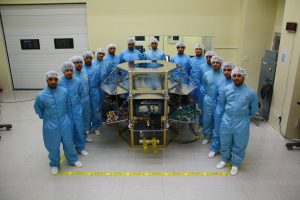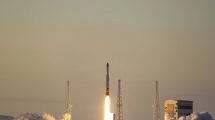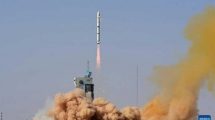 The Emirates Institution for Advanced Science and Technology (EIAST), the UAE’s national initiative to promote scientific and technological innovation, has announced that Dubai Sat-2 will be moved from South Korea to Russia, in preparation for its imminent launch.
The Emirates Institution for Advanced Science and Technology (EIAST), the UAE’s national initiative to promote scientific and technological innovation, has announced that Dubai Sat-2 will be moved from South Korea to Russia, in preparation for its imminent launch.
The launch of Dubai Sat-2 will be conducted in collaboration with the Russian International Space Company (ISC), Cosmodrome.
Yousuf Al Shaibani, Director General of EIAST, says Dubai Sat-2 represents the second phase of the institution’s plan to set up an integrated and highly qualified team of Emirati engineers and to develop human resources with the aim of enhancing the UAE as a global hub for space technology.
DubaiSat-2 is the second satellite programme of EIAST and a joint development programme between EIAST and Satrec Initiative of South Korea, in which 20 engineers from the UAE have been working on the design, development, testing and manufacturing of the satellite. The agency plans to launch the satellite in the last quarter of this year. It will be launched by ISC Kosmotras on board a Dpner rocket from Yasny Cosmodrome in Russia.
The remote sensing satellite will feature an electro-optical earth observation satellite system with a ground sampling distance of 1m at 600km sun-synchronous orbit. It will weigh 300kg, a third more than its predecessor. The satellite will orbit closer to the Earth at a faster speed and will cover 17,000 square metres per day, more than the 12,000 metres covered by DubaiSat-1.
DubaiSat-2 will incorporate a wide range of new technologies not implemented in its predecessor, allowing it to exceed the performance of spacecraft in its weight class.
EIAST was established in order to promote advanced research and technological innovation, more specifically satellite technology, to build a well-established internationally competitive base for human skills development, to position Dubai and the UAE as a hub for space technology development internationally, to optimise the potential of EIAST satellite programmes, DubaiSat-1 and DubaiSat-2, through broadening their applications, and lastly to provide support to decision makers in all sectors through application of its specialist skills.
In order for EIAST to achieve its goal of using space technologies and applications effectively, the institution has pursued four programmes — research and development of outer space, satellite manufacturing and system development, Earth observation from satellite images, and ground station services and support to other satellites.












Add Comment